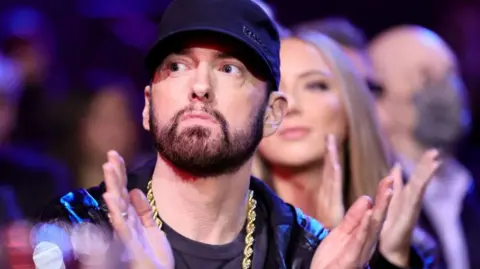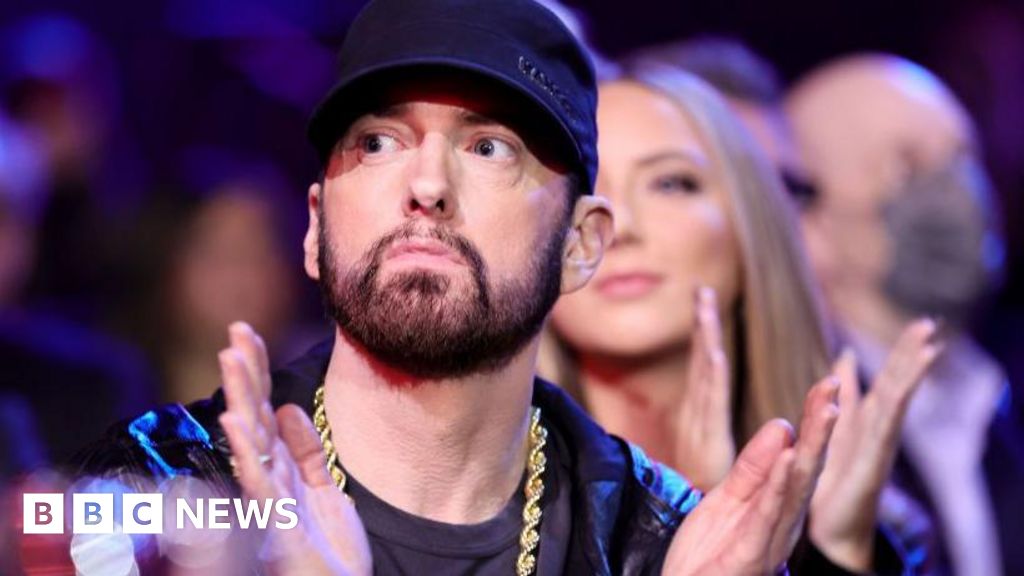 Getty Images
Getty ImagesSpotify has won a lengthy court case in which the company was accused of streaming Eminem’s music without permission.
The case was Released in 2019 by the rapper’s publisher, Eight Mile Stylewhich stated that Spotify had not properly licensed Eminem’s work.
They sued the music company for around £30 million, claiming the star never received full payment for songs such as “Lose Yourself” and “Without Me”, which were “streamed billions of times on Spotify”.
However, a judge in Tennessee ruled that Spotify could not be held liable for lost royalties, even though he concluded that Spotify did not have a license to stream the tracks.
The court also concluded that if Spotify is found guilty of copyright infringement, any penalty will have to be paid by Kobalt Music Group, which collected the royalties on behalf of Eminem’s publisher.
The case illustrates how confusing the business of managing music rights has become in the age of streaming.
 Getty Images
Getty ImagesWhen Eight Mile Style sued Spotify in 2019, it said the company had “acted fraudulently” by pretending to own licenses to 243 of Eminem’s songs when it did not.
The company was also accused of making “arbitrary payments” for hits that had been streamed hundreds of millions of times, with the money only representing “a fraction of those streams.”
Interestingly, Eminem was not a party to the litigation and only learned about the lawsuit when it was filed.
“(We are) as surprised by this news as everyone else,” His publicist told The Verge at the time:
The star’s music remained on Spotify throughout the five-year process. With 76 million monthly listeners, he is currently the 12th most streamed artist on the platform.
“Defies all logic”
Spotify responded to the lawsuit in 2020 by blaming Kobalt Music Publishing, a company that manages the rights to hundreds of thousands of songs and collects royalties for rights holders.
In court documents, Spotify claimed that Kobalt misled the company into believing it controlled the management of Eight Mile’s catalog when it did not.
The company added that Eight Mile has “never questioned” Spotify’s permission to stream Eminem’s songs, even though the service has accepted royalties from him since its U.S. launch in 2011.
“Instead, Eight Mile suggests that the company was somehow ‘deceived’ by Spotify into believing the compositions were properly licensed. This is intended to explain why the company knowingly accepted and deposited royalties while remaining silent for years,” the company’s lawyers said.
“The story of Eight Mile defies all logic.”
Eight Mile called these allegations “baseless,” and the case went back and forth for several years as lawyers argued over the details of the case.
The proceedings were temporarily delayed due to a dispute over whether Spotify CEO Daniel Ek would be removed in the case.
Although the judge ruled that he was being compelled to testify, the parties ultimately moved for summary judgment to avoid a trial.
 Getty Images
Getty ImagesJudge Aleta A. Trauger released her opinion on August 15, writing that Spotify should not be held liable for damages.
She stressed that while Kobalt is entitled to collect royalties for Eminem’s music, it is not entitled to license the songs in the United States and Canada.
Instead, in 2009, those rights were transferred to a company called Bridgeport Music, which is affiliated with Eight Mile itself.
However, the company “never officially notified any third party that it was licensing Eminem’s music,” Judge Trauger wrote.
This circumstance is “inexplicable”, said the judge, unless it is a “strategic” attempt to get money out of Spotify by claiming copyright infringement.
She pointed out that the company never sent Spotify “a single cease and desist letter” and said Eight Mile was not the “helpless victim” it claimed to be.
“Eight Mile Style had every opportunity to make things right and simply chose not to do so for no apparent reason other than that it pays better to be a victim of copyright infringement than to be a run-of-the-mill licensor,” she wrote.
The judge also found that the agreement between Spotify and Kobalt did not contain a database of the songs that could and could not be streamed.
“Kobalt’s primary reason for this approach is that the catalog of a large administrator like Kobalt would change regularly, making any list almost instantly out of date,” she wrote.
This approach “makes it surprisingly plausible that Spotify might actually be confused at times about which rights it owns and which it doesn’t.”
However, one element of the contract between Spotify and Kobalt was clear: it protected the company from copyright claims on any works “managed” by Kobalt.
This means that the company will have to pay all legal costs incurred over the last five years, which can be a significant amount.


